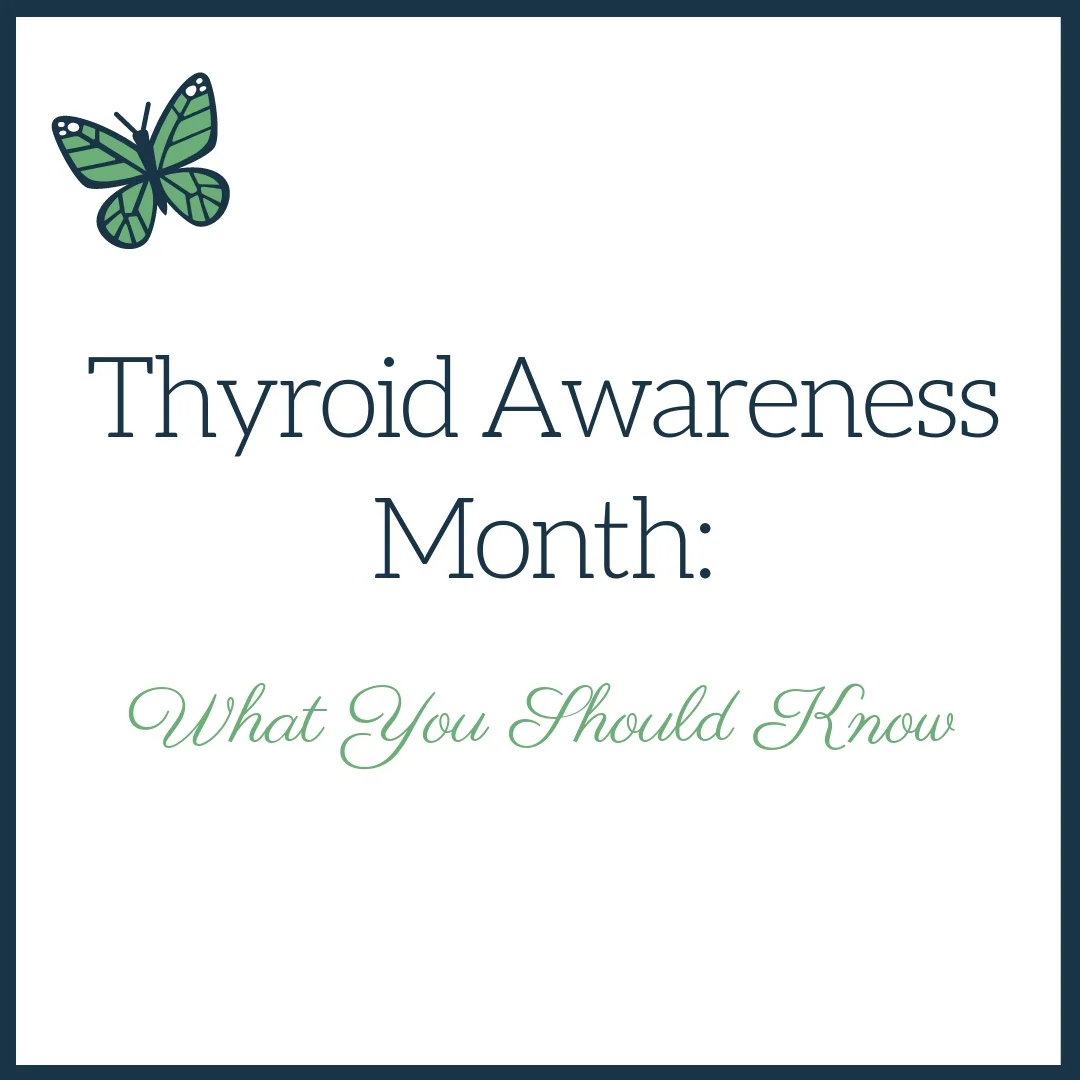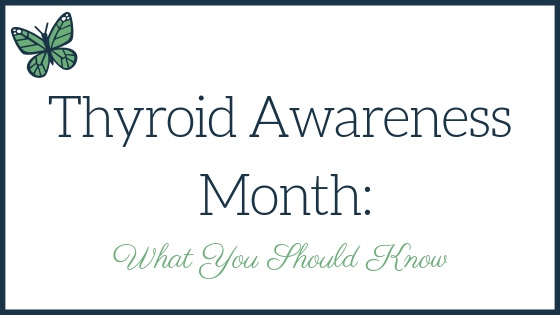January is Thyroid Awareness Month so I wanted to bring a little more awareness to this growing group of diseases and overall thyroid health throughout this month. Have you ever heard of thyroid disease? Do you know what your thyroid is and what it does? Did you know that Hashimoto’s Thyroiditis is one of the most prevalent autoimmune diseases? In this post I’ll talk more about the thyroid gland, thyroid diseases, thyroid testing and and why it is all important.
I wish I had known way more about thyroid health much sooner than when I was diagnosed with hypothyroidism. The more I’ve learned and read about hypothyroidism, the more I’m convinced it started after my pregnancy, which was 8 years prior to my diagnosis. I dealt with postpartum depression as well as some other bouts of depression, anxiety, stubborn weight that didn’t come off easily, thinning and dry hair, and mood issues. I still deal with some of these occasionally but it’s so much better than it was. You can read more about my story in this post. Determination to figure out what I was going through and how to feel better is what drove me toward integrative and functional nutrition, especially working with others with thyroid disease.
According to The American Thyroid Association, more than 12% of the American population will develop a thyroid condition at some time in their life. That is about 1 out of every 8 Americans, with women being 5 to 8 times more likely to develop thyroid disease. But, they say that up to 60% of those with thyroid disease are unaware of their condition. That is a very large percentage! Undiagnosed thyroid disease can lead to other health problems including cardiovascular disease, osteoporosis and infertility. That is why thyroid awareness is so important!
What is the Thyroid Gland?
The thyroid gland is a butterfly-shaped gland in the middle of the neck that produces hormones. It plays a major role in metabolism and growth and development. It controls our body temperature, how efficiently our body burns energy, and our menstrual cycles just to name a few. Basically, thyroid hormones affect every cell and organ in the body.
The thyroid gland produces thyroid hormones T3 (triiodothyronine) and T4 (thyroxine or tetraiodothyronine). The body needs more T3, the active form, but produces more T4, which must be converted into T3. There is a potential of underlying causes not allowing proper conversion of T4 to T3, which can continue to cause hypothyroid symptoms.
Then there is thyroid stimulating hormone, or TSH, which is produced by the pituitary gland. Its job is to signal the thyroid to release hormones. The amount of TSH released depends on the amount of hormones already circulating in the blood. It all needs to work together properly for optimal thyroid function.
What is Thyroid Disease?
There are different types of thyroid diseases where too little or too much thyroid hormone is produced. There are also autoimmune diseases that attack the thyroid gland. I’ll briefly discuss hypothyroidism, hyperthyroidism, Hashimoto’s Thyroiditis and Graves’ Disease.
Hypothyroidism is where the thyroid gland does not produce enough thyroid hormone, or is underactive. It is much more common than hyperthyroidism. Symptoms of hypothyroidism include weight gain, sensitivity to cold, fatigue, brain fog, anxiety, depression, constipation, dry and brittle fingernails, loss or thinning of hair, irregular menstrual cycles, edema and puffiness, joint aches, and trouble sleeping. I suffer(ed) from many of these symptoms and didn’t realize they were all related.
Hyperthyroidism is an overactive thyroid or where the thyroid produces too much hormone. Symptoms include unexplained weight loss, rapid heart rate, excess sweating, irritability, and shaky hands.
Hashimoto’s thyroiditis is an autoimmune disease, meaning the immune system attacks its own healthy cells. With Hashimoto’s, the immune system attacks the thyroid gland and produces antibodies against the thyroid eventually causing the thyroid to not produce hormone properly. It is estimated that around 90% or more of those with hypothyroidism have Hashimoto’s.
Graves’ Disease is also an autoimmune disease, where the immune system attacks the thyroid gland. The antibodies produced in Graves’ Disease cause the thyroid gland to grow and produce too much thyroid hormone. It can also cause problems with the eyes, called Graves’ Ophthalmopathy.
What Tests Detect Thyroid Disease?
TSH (thyroid stimulating hormone) - This is the most common thyroid test run when checking for thyroid function. The lab range is controversial. Most functional medicine doctors looking for a lower number than conventional medicine ranges for optimal symptom improvement.
Free T3 - the amount of T3 hormone circulating in the bloodstream
Free T4 - the amount of T3 hormone circulating in the bloodstream
Reverse T3 - produced from T4 but blocks the action of free T3 so it can not be used.
The following antibody tests are used to diagnose autoimmune thyroid disease.
TPOAb - thyroid peroxidase antibody
TgAb - thyroglobulin antibody
A full thyroid panel should include all of these tests. The reverse T3 may be an add-on test and not included in the panel.
Takeaways
With as many as 60% of Americans unaware that they have a thyroid disease, it is important to be aware of symptoms and to have a regular screening done by your physician. Many women present to their doctor with symptoms of a thyroid disorder but are referred to other specialists or are treated for their individual symptoms rather than looking at the thyroid. If you are like me, you don’t even realize that the thyroid can be to blame.
If you aren’t sure if your doctor is checking any thyroid labs when you do blood work, you need to ask. If you aren’t sure if your doctor is running all of the appropriate thyroid labs, you need to ask. If your doctor is dismissing your symptoms or prescribing medications for your individual symptoms, find a second opinion and someone who will listen. Know your body, know your symptoms and take control of your health.
Comment below on anything you’d like to know more about with thyroid health. Want to learn more about what I do? Apply for a free consult call here.
In health,
Lin


